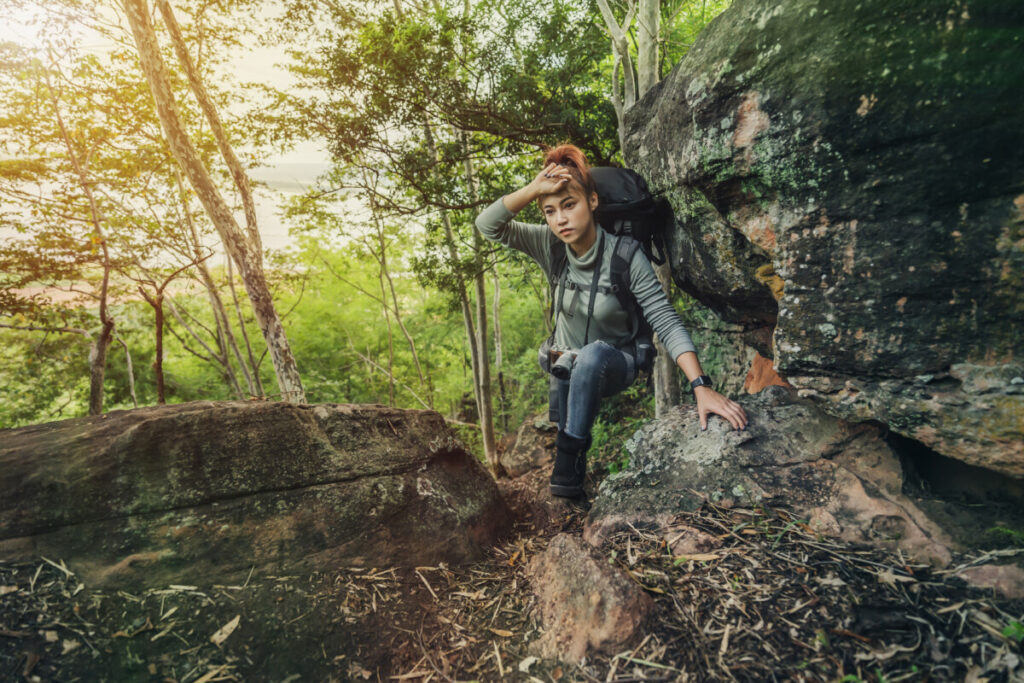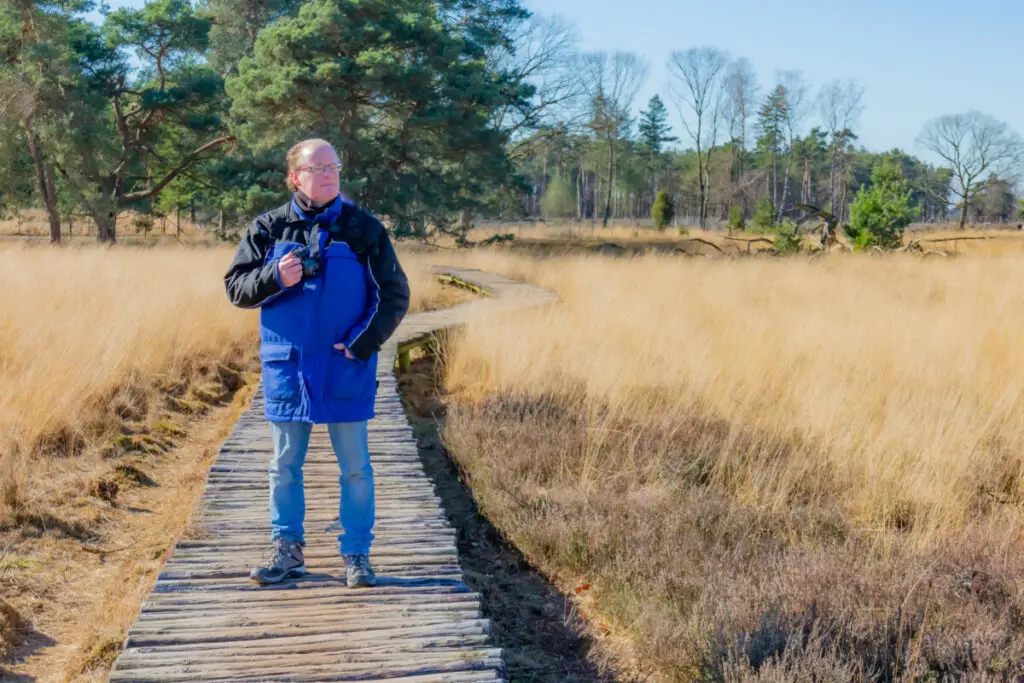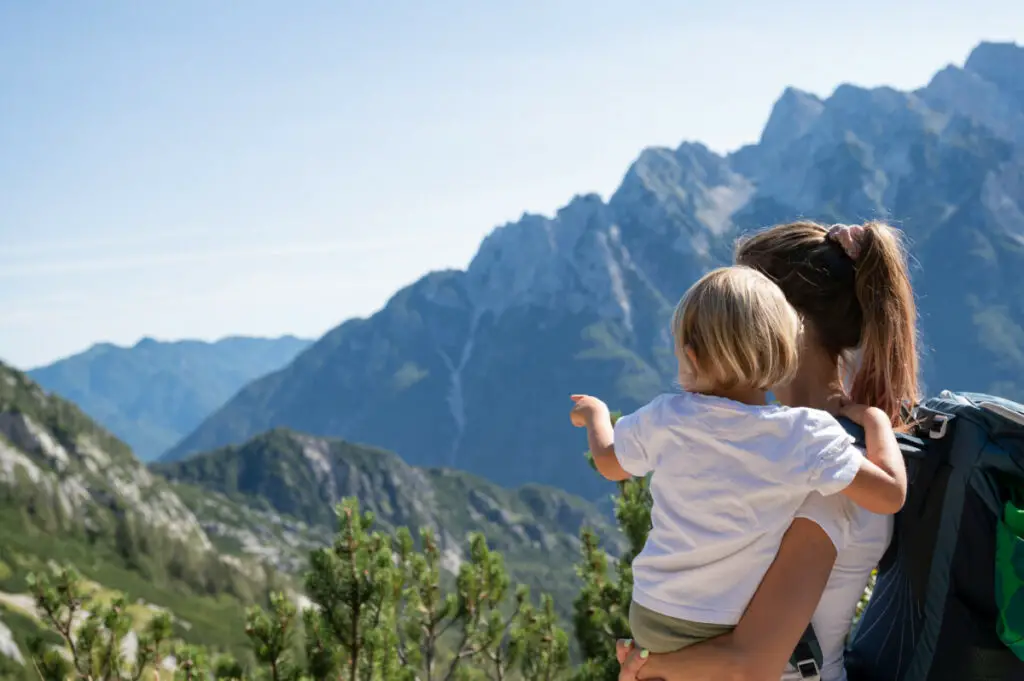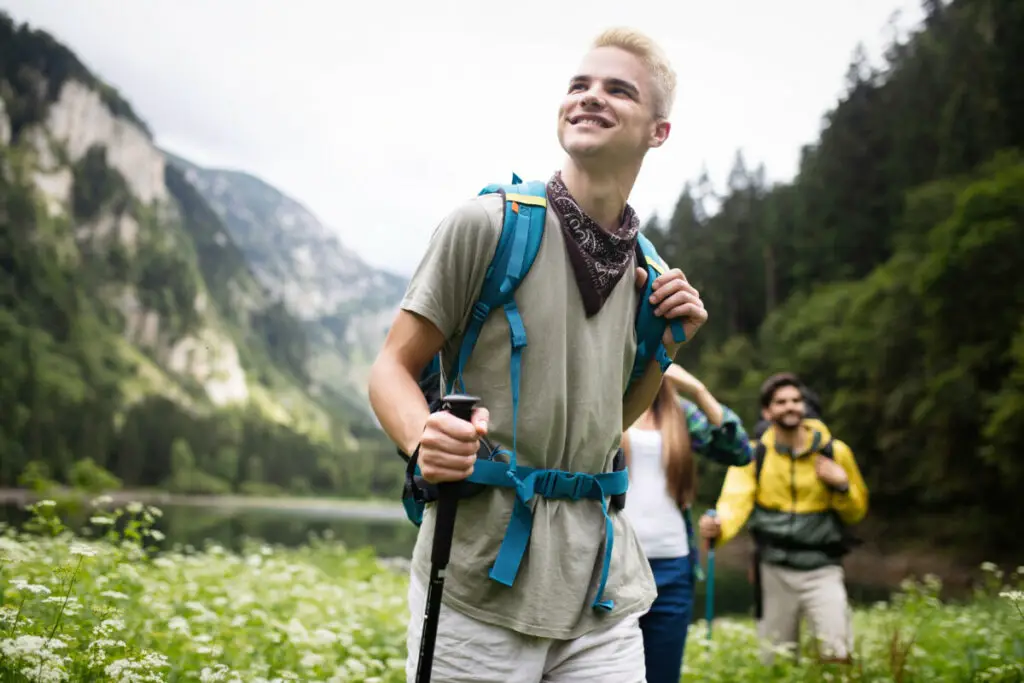
Hiking, if you do it wrong, is a miserable uphill battle, but it doesn’t have to always entail physical pain and suffering. In fact, hiking can be extremely enjoyable and easy if you start off on the right foot. There are several simple steps that will quickly help make hiking feel easier.
After just a few trails, a hiker’s leg muscles will begin to adapt and hiking will get much easier. To adapt more quickly, start on short trails, begin early in the day, bring motivating friends, and pack light. Simple, muscle-toning exercises between hikes will also make the process more enjoyable.
Every spring, I suffer through the first few hikes of the season and wonder if my legs will ever be strong again. But sure enough, as soon as I’ve begun to put in the effort, it gets easier! If you take the time to plan ahead and prepare your body in simple ways, you might be amazed at how quickly your muscles adapt to the trail.
How to Quickly Get Better at Hiking
Hiking provides a host of mental and physical benefits that are impossible to ignore. It’s rejuvenating, it brings peace and stability, and it helps your entire body become stronger and healthier in ways that few other physical activities can. But if you’ve ever suffered through a steep, dusty trail that you weren’t prepared to face, the whole idea of getting started again can be a bit cyclically daunting. How does hiking get easier if you’re just not good at it?
Well, the truth is, anyone can hike. You don’t have to have a certain skill set or even body type. All you need is the desire to enjoy nature and the motivation to simply get started. Once you’ve taken the first few steps, you’ll be just fine. Of course, if you try to conquer the Appalachian Trail or Mount Everest without any preparation, it’s going to be miserable. So, here are a few ways to help make hiking easier and to build your skills and muscles more quickly so that you’re ready to conquer longer, harder trails:
Stay in Shape
The biggest problem that people face when hiking is feeling out of shape. You don’t need to be a skinny, perfectly toned athlete—not by a long shot—but you do need to make sure your body is ready for the physical activity. Going on regular walks around your neighborhood, taking the stairs instead of the elevator at work, doing lunges or simple weight-bearing exercises at home, etc. are all easy ways to keep your body accustomed to the physical demands of hiking.
Pack Light
Beginning hikers often worry about anything and everything they may encounter on the trail, so they often overpack. Being prepared is not a problem; in fact, it’s always better to be prepared than to begin a hike with absolutely no gear or precautions. But anything you bring that you don’t necessarily need will just be extra weight that you have to carry up and down the mountain. Save your energy by only bringing what you need.
Start Early in the Day
My friends and I once made the mistake of beginning an 8-mile hike in the middle of a day in July. Needless to say, we could barely make it two miles before we ran out of water and had to turn back. It was miserably draining. Always start hikes early in the day or in the evening so that you can enjoy the cool, fresh air and stay rejuvenated for much longer.
Begin with Easy Hikes

This may seem obvious, but you’d be surprised how many hikers simply jump into a rigorous, advanced-level trail before they are ready to face it. Always start with short loop trails or brief in-and-out trails, no more than 3 miles and no more than 1000 feet of elevation gain. Let your body get accustomed to the rhythm and feel of hiking. Even if it’s a 10 or 20-minute walk in the woods, your sense of enjoyment will provide your brain the necessary motivation to conquer your next trail, time and time again.
“Start small and push further and further and they will develop the strength for bigger and bigger hikes. They may be the slowest on the trail, but that still means they are infinitely faster than everyone who didn’t try.”
Jennifer, WA
Do Your Research
Always look up information about the trail before you go. Some trails are blocked off during certain times of the year, and other trails require an entrance fee. Do all you can to prepare yourself and your gear for the demands of the trail. Hiking will be much easier if you’ve already anticipated otherwise unforeseen circumstances.
Wear Beginner-Friendly Gear
Comfortable gear goes a long way in making hiking easier. Always wear shoes that fit well and have a good amount of tread. Never wear brand new shoes or even brand new clothes on a hike; you’re bound to get blisters and can possibly chafe. Wear clothes that are well broken-in, and you’ll be much more comfortable. The same goes for other gear, like backpacks, hats, and hiking accessories like trekking poles or fanny packs.
Keep Breaks Brief
Regularly take rest stops. It’s important to catch your breath, restore your energy with a snack, cool your feet down, and take a good long drink. These are even great moments to take pictures or admire the view—you are here to enjoy nature, after all! But keep your pauses under 15 minutes long; any longer and your muscles will begin to cool down and relax to the point where it will be difficult to get started again. Hit the trail at a steady pace by taking regular, but brief breaks.

Stay Hydrated
This one is crucial. If you want hiking to be easier, your body absolutely needs water. I’ve tried drinking the bare minimum while hiking (to avoid the detestable task of having to find a private place in the woods) but it’s just not worth it; your head will be pounding, your muscles will ache, and you’ll even get dizzy and irrational. Always stay as hydrated as possible. Your body needs water in order to function at the best of its ability.
Don’t Push Your Body Too Hard
Hiking is not a race; it’s all about endurance. Develop a pace you are comfortable with and stick to it. Especially if you’re going uphill, take your time and make sure you’re breathing regularly. Never push your body to the point of respiratory rates that you’re trembling from the strain and gasping for air. Pushing your heart and your muscles to these limits can be dangerous and traumatic, taking all the enjoyment out of hiking.
Descend Gently
Last but not least, don’t strain your feet or knees with a rapid descent. Take your time when going downhill, because the gravitational pull of a steep incline can jar your joints with every painful step. Even if you don’t feel pain in the moment, you will later. Spare yourself the shin splints and the rolled ankles and just take it easy. You can even descend in a makeshift, zig-zag switchback pattern on particularly steep sections; this will help alleviate the strain tremendously.
How to Make Hiking Easier Mentally
Mind Over Matter
You’ll hear athletes say this all the time; pushing your body beyond its physical comfort level is more of a mental battle than a physical one. The first 20 minutes or so of a hike will always feel the hardest, no matter what your skill level or experience is. This is because your body is naturally inclined to resist things that are uncomfortable or energy-draining.
Keep your mind focused on what you want to gain from the experience, and sooner or later your body will adapt. In my experience, after those first 20 minutes, you experience something comparable to a runner’s high, where your body is so accustomed to the movement that you just feel joyful and spry, able to conquer the next hill or peak with boundless energy!
Set Realistic Goals
It doesn’t matter what your skill level, experience, or physical condition is: instead of comparing yourself to other hikers, set personal goals based on what you hope to accomplish. What do you want to get out of hiking? Why do you enjoy it? What are you hoping to gain? What skills would you like to develop?
For instance, my goal is to be better at waking up early and taking time to ponder on a regular basis, so I do short hikes early in the morning about once a week or so. It doesn’t matter how long or difficult the hike is: I’m accomplishing my personal goals, and that is far more gratifying. Think about what works for you, then ignore the rest and just go for it!
“Let go of what you envision a hiker should be and embrace the hiker you are going to be!”
Rebecca Hosley

Bring Motivating Friends
Last but not least, share your goals and your passion for hiking with good friends, people who will help motivate you and keep you going. Not only is it much safer to hike with at least one other person, it’s also much more enjoyable! People who know you well and who can remind you of your goals will help you keep going when the hike gets tough. I can’t even count the number of times that a friend has kept me from turning around, and boy was I glad each time I finished a hike! You’ll feel so proud when you reach that final view or destination, and you’ll feel even prouder of the fact that your body and mind are quickly developing the skills necessary to conquer such hard things.

